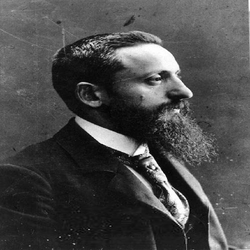Biography:Émile Meyerson
Émile Meyerson | |
|---|---|
 | |
| Born | 12 February 1859 Lublin, Congress Poland |
| Died | 2 December 1933 (aged 74) |
| Alma mater | University of Heidelberg |
| Era | 20th-century philosophy |
| Region | Western philosophy |
| School | French historical epistemology[1] Epistemological realism Neo-Kantianism[2] |
Main interests | History and philosophy of science, epistemology, general relativity |
Notable ideas | Principle of lawfulness,[3] principle of causality[3] |
Émile Meyerson (French: [mɛjɛʁsɔn]; 12 February 1859 – 2 December 1933) was a Polish-born French epistemologist, chemist, and philosopher of science. Meyerson was born in Lublin, Poland. He died in his sleep of a heart attack at the age of 74.
Biography
Meyerson was educated at the University of Heidelberg and studied chemistry under Robert Wilhelm Bunsen. In 1882 Meyerson settled in Paris. He served as foreign editor of the Havas news agency, and later as the director of the Jewish Colonization Association for Europe and Asia Minor. He became a naturalized France citizen after World War I.
Thomas Kuhn cites Meyerson's work as influential while developing the ideas for his main work The Structure of Scientific Revolutions.[4]
In La Déduction relativiste, Meyerson expressed the view that Einstein's general theory of relativity was a new version of the identification of matter with space, which he considered "the postulate upon which the whole (Cartesian) system rests."[5]
Works
- Identité et réalité (1908)
- De l'explication dans les sciences, 2 vols. (1921)
- La déduction relativiste (1925)
- Du cheminement de la pensée, 3 vols. (1931)
- Réel et déterminisme dans la physique quantique (1933)
- Essais (1936)
See also
- Franciszka Arnsztajnowa
Notes
- ↑ Donald Broady, "The epistemological tradition in French sociology", 1996.
- ↑ M. Anthony Mills, "Identity versus determinism: Émile Meyerson׳s neo-Kantian interpretation of the quantum theory", Studies in History and Philosophy of Science Part B: Studies in History and Philosophy of Modern Physics' 47:33–49 (2014).
- ↑ 3.0 3.1 Émile Meyerson – The Internet Encyclopedia of Philosophy
- ↑ Thomas S. Kuhn, The Structure of Scientific Revolutions: 50th Anniversary Edition, University of Chicago Press, 2012, p. xl.
- ↑ Quoted in Arthur O. Lovejoy, The Revolt against Dualism: An Inquiry Concerning the Existence of Ideas (New Brunswick, NJ: Transaction Publishers, 1996), p. 5; Lovejoy's translation [orig. publ. 1930].
External links
- Miguel Espinoza, "Meyerson, Physics and the Intelligibility of Nature"
 |

